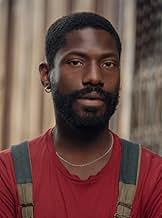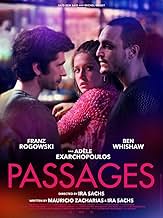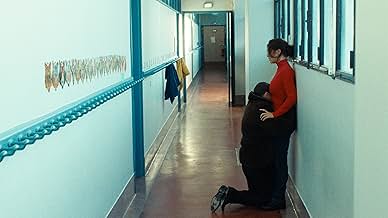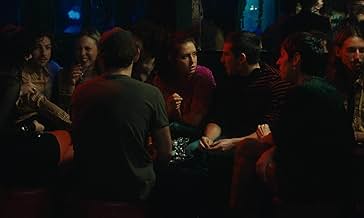VALUTAZIONE IMDb
6,6/10
13.843
LA TUA VALUTAZIONE
Di due uomini che stanno insieme da quindici anni e di cosa succede quando uno di loro ha una relazione con una donna.Di due uomini che stanno insieme da quindici anni e di cosa succede quando uno di loro ha una relazione con una donna.Di due uomini che stanno insieme da quindici anni e di cosa succede quando uno di loro ha una relazione con una donna.
- Regia
- Sceneggiatura
- Star
- Premi
- 4 vittorie e 26 candidature totali
Thibault Carterot
- Thibault
- (as Thibaut Carterot)
Theo Gabilloux
- Young Actor
- (as Théo Gabilloux)
Recensioni in evidenza
"Passages" is a master class in building a film around an unlikable character.
Franz Rogowski gives a commanding performance full of charisma and sex appeal as a sexually fluid narcissist who can't stand to let anyone around him be happy without him (or even really with him, for that matter). Viewed with a live audience, the movie becomes almost something of a comedy, and it was a hoot hearing the people in the theater with me reacting with more and more vocal disbelief at just what a jerk this main character could be. It's a morbidly fascinating character study -- it's almost like watching a day in the life of a sociopath.
I should have been exasperated with this character and movie and probably would have been if it had been handled differently. But as is, with Ira Sachs's excellent direction and the film's terrific acting, it's instead one of the best movies I've seen so far this year.
Grade: A.
Franz Rogowski gives a commanding performance full of charisma and sex appeal as a sexually fluid narcissist who can't stand to let anyone around him be happy without him (or even really with him, for that matter). Viewed with a live audience, the movie becomes almost something of a comedy, and it was a hoot hearing the people in the theater with me reacting with more and more vocal disbelief at just what a jerk this main character could be. It's a morbidly fascinating character study -- it's almost like watching a day in the life of a sociopath.
I should have been exasperated with this character and movie and probably would have been if it had been handled differently. But as is, with Ira Sachs's excellent direction and the film's terrific acting, it's instead one of the best movies I've seen so far this year.
Grade: A.
Who knows what routes were taken to be you, the entrances and doorways you've passed through, the aisles and the channels, the thoroughfares you've unravelled, the barriers you've broken and forced through. As you begin a fresh departure from your husband, deploying all your tools, with a brand new hand, falling for French girl Agathe, trying on restyled hat, nipping back to make sure flames are truly fanned. As the music stops you look for a new chair, continuing with conflict and despair, like a ball (a pair even) you bounce around, a kind of yo-yo is unwound, until you're snookered and then left, to go nowhere.
Intimacy can be a beautiful thing. However, it can also become something messy, hurtful and emotionally devastating when tainted by self-serving agendas, irresponsible intentions, or reckless, short-sighted experimentation, influences that can purposely or unwittingly end up wreaking widespread havoc. Such is the case in writer-director Ira Sachs's new domestic drama about a flamboyant, free-spirited gay male filmmaker, Tomas (Franz Rogowski), who impulsively jumps into an impromptu fling with a woman, Agathe (Adèle Exarchopoulos), a relationship that leaves his longtime husband, Martin (Ben Whishaw), unsure of what the couple's future might hold. As time passes, circumstances grow increasingly complicated as each member of this unlikely trio tries to sort out what lies ahead, particularly with the emergence of Tomas's ever-growing thoughtless capriciousness. Some viewers may look upon the story's shockingly reprehensible developments as improbable and appalling, but, sadly, as anyone who has ever watched tabloid TV can probably attest, the events depicted here might not appear as far-fetched as one might think. In that respect, this offering presents a bold, courageous, honest look at what can go awry in situations like this, an account loaded with incensed outrage, unbridled ire, biting humor and more than a little cynicism. It's a narrative that some audience members may find offensive, even deplorable, but, like a horrific car accident, it's also something that many viewers might find difficult to look away from, thanks in large part to the wholly convincing performances of the three protagonists. Sensitive viewers should be aware that the film includes a fair amount of explicit and provocative sexual content, so those easily offended by such material may not want to put this one on their watch lists. However, for those who appreciate domestic dramas that hold nothing back and that aren't afraid to get down and dirty in their portrayals of what can happen, this release is about as good as any out there. Just be prepared to be left with your jaw agape - and your head spinning.
German film director Tomas (Franz Rogowski) and his British commercial artist husband Martin (Ben Whishaw) have been together for 15 years ...quite an achievement, I'd say, given just how immature, capricious and utterly self-obsessed Tomas routinely shows himself to be. Pretty much the only glue holding them together appears to be the fact that, whatever else may have gone stale between them, the sex is still good.
Although the script never explicitly mentions it, it would appear that theirs is an exclusive marriage: i.e. There are no intimations given to suggest that it's an open relationship, in which permission to "play away" has been agreed - so when, out of the blue, Tomas finds himself intensely attracted to a 20-something female schoolteacher called Agathe - an attraction he pursues with typically impulsive selfishness and no regard for anybody's feelings but his own - the impact on Martin (and, in due course, Agathe) is just as seismic as you'd expect.
Essentially what we have here is a portrait of a narcissist, in thrall to his own impulses, manipulative and duplicitous when it suits his purpose, and incapable of facing up to the consequences of his actions. Tomas is a study in arrested development: emotionally he's barely more than a toddler - a little boy who, on seeing a shiny new toy, must have it, and cannot understand why everybody else can't just go with his flow and let him have his way.
It's a tough challenge to play an unlikeable character and still keep your audience invested in them, but Rogowski pulls it off superbly, showing us that Tomas is as much a victim of his destructive personality traits as is everyone else who falls foul of them. As much as I despised Tomas's behaviour, I couldn't help but find myself feeling sympathy for his damaged soul. In that final night-time bike ride through Paris - having lost, by his own actions, everything of genuine value - he is truly heading nowhere.
Addendum: In the course of this movie I learned a frankly jaw-dropping, thing - that, in the 21st century, French schools have appallingly lax security: apparently any random stranger can get on the premises and barge into a classroom!
Although the script never explicitly mentions it, it would appear that theirs is an exclusive marriage: i.e. There are no intimations given to suggest that it's an open relationship, in which permission to "play away" has been agreed - so when, out of the blue, Tomas finds himself intensely attracted to a 20-something female schoolteacher called Agathe - an attraction he pursues with typically impulsive selfishness and no regard for anybody's feelings but his own - the impact on Martin (and, in due course, Agathe) is just as seismic as you'd expect.
Essentially what we have here is a portrait of a narcissist, in thrall to his own impulses, manipulative and duplicitous when it suits his purpose, and incapable of facing up to the consequences of his actions. Tomas is a study in arrested development: emotionally he's barely more than a toddler - a little boy who, on seeing a shiny new toy, must have it, and cannot understand why everybody else can't just go with his flow and let him have his way.
It's a tough challenge to play an unlikeable character and still keep your audience invested in them, but Rogowski pulls it off superbly, showing us that Tomas is as much a victim of his destructive personality traits as is everyone else who falls foul of them. As much as I despised Tomas's behaviour, I couldn't help but find myself feeling sympathy for his damaged soul. In that final night-time bike ride through Paris - having lost, by his own actions, everything of genuine value - he is truly heading nowhere.
Addendum: In the course of this movie I learned a frankly jaw-dropping, thing - that, in the 21st century, French schools have appallingly lax security: apparently any random stranger can get on the premises and barge into a classroom!
Not all films need to be message driven, but I think any director or writer makes a film because they have something to say. In that sense, I'm not sure what 'Passages' wanted to say.
There was an ample potential to make an interesting social cut in the age of more fluid sexuality. "don't pigeon-hall yourself", "follow your heart"", you could be anything and love anybody"... and so on all sound great, but how it actually works in reality, and how it could clash with the traditional idea of a committed relationship, gender roles, and responsibility of a parenthood. There still are remnants of such questions and reflections in 'Passages'. Problem is Tomas is too big a rotten character and consumes all the drama. He's self absorbed (resulting in being selfish even without a malicious intend), cowardly, dishonest with himself and others, emotionally needy yet wants to dominate the situation, and above all manipulative (oh, and his fashion sense is pretty atrocious, but that's just based on my taste). It makes in contrast his male and female partners innocent victims, leaving very little room for a balanced reflection on sexuality/relationship/gender role issues.
Maybe a social commentary was not the director's intention. Maybe a character study was the goal? But surprisingly we don't really get to see the depth of Tomas and even less of Martin and Agathe. Why is Tomas the way he is? What was Tomas's relationship with Martin like before the storm? What did Tomas really see in Agathe and the future with her?
All the sex scenes were fun to watch, but if a character study was the goal maybe the film could have used those minutes more towards... well, to show the character. 'A rotten character ruins the lives of others' is too obvious a conclusion for a character study or even just any old relationship drama.
Passages is an OK drama. Technically sufficient and actings are decent (though I think it failed to utilize all the potential of such interesting actors as Whishaw and Rogowski). But it left me wondering what it really was all for... or is it just me out of my depth?
There was an ample potential to make an interesting social cut in the age of more fluid sexuality. "don't pigeon-hall yourself", "follow your heart"", you could be anything and love anybody"... and so on all sound great, but how it actually works in reality, and how it could clash with the traditional idea of a committed relationship, gender roles, and responsibility of a parenthood. There still are remnants of such questions and reflections in 'Passages'. Problem is Tomas is too big a rotten character and consumes all the drama. He's self absorbed (resulting in being selfish even without a malicious intend), cowardly, dishonest with himself and others, emotionally needy yet wants to dominate the situation, and above all manipulative (oh, and his fashion sense is pretty atrocious, but that's just based on my taste). It makes in contrast his male and female partners innocent victims, leaving very little room for a balanced reflection on sexuality/relationship/gender role issues.
Maybe a social commentary was not the director's intention. Maybe a character study was the goal? But surprisingly we don't really get to see the depth of Tomas and even less of Martin and Agathe. Why is Tomas the way he is? What was Tomas's relationship with Martin like before the storm? What did Tomas really see in Agathe and the future with her?
All the sex scenes were fun to watch, but if a character study was the goal maybe the film could have used those minutes more towards... well, to show the character. 'A rotten character ruins the lives of others' is too obvious a conclusion for a character study or even just any old relationship drama.
Passages is an OK drama. Technically sufficient and actings are decent (though I think it failed to utilize all the potential of such interesting actors as Whishaw and Rogowski). But it left me wondering what it really was all for... or is it just me out of my depth?
Lo sapevi?
- QuizThe film was rejected by both the Cannes Film Festival and the Venice Film Festival. It ended up having its world premiere at the Sundance Film Festival 2023.
- Citazioni
Tomas Freiburg: Martin!
Martin: Uh-huh?
Tomas Freiburg: Agathe is pregnant.
Martin: Did you sleep with me to tell me that?
- Colonne sonoreWon't You Buy My Sweet Blooming Lavender
Written by Janet Penfold
Performed by Janet Penfold (uncredited)
Also performed by Franz Rogowski (uncredited)
I più visti
Accedi per valutare e creare un elenco di titoli salvati per ottenere consigli personalizzati
- How long is Passages?Powered by Alexa
Dettagli
Botteghino
- Lordo Stati Uniti e Canada
- 551.611 USD
- Fine settimana di apertura Stati Uniti e Canada
- 63.277 USD
- 6 ago 2023
- Lordo in tutto il mondo
- 1.116.810 USD
- Tempo di esecuzione1 ora 31 minuti
- Colore
- Proporzioni
- 1.66 : 1
Contribuisci a questa pagina
Suggerisci una modifica o aggiungi i contenuti mancanti

































